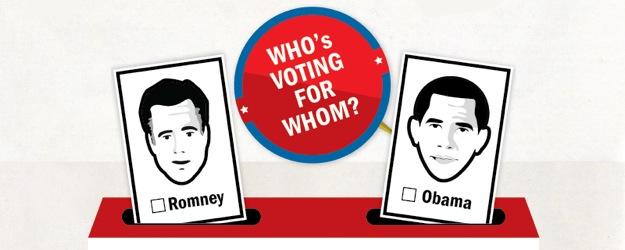 With all the partisan complaining and fighting coming out of this year’s US Presidential Election, you might think that there’s nothing that Democrats and Republicans can agree on, but there is: The shopping experience known as Target. There’s also The Hangover, football and soccer.
With all the partisan complaining and fighting coming out of this year’s US Presidential Election, you might think that there’s nothing that Democrats and Republicans can agree on, but there is: The shopping experience known as Target. There’s also The Hangover, football and soccer.
These similarities are some of the facts coming from a comparison of Obama and Romney fans on Facebook that’s been released by social media ad platform Compass Labs. Using its data-mining powers for good (Well, informative purposes) instead of evil (That is to say, marketing purposes), Compass has revealed that while Obama may have more Facebook fans, Romney’s smaller number is more passionate and more in tune with what their guy is saying.
Obama has 28,365,075 fans to Romney’s 6,446,941 fans on Facebook – or, at least, those numbers were the case when Compass surveyed the information – but Romney has the edge on both the amount of online chatter about candidates (3,340,348 people talking about him, against Obama’s 3,051,585) and level of fan engagement in terms of those “liking” statuses or messages – 52 percent for Romney versus a paltry 11 percent for Obama.
(Interestingly enough, there are more Republican Facebook fans than Democrat fans by a considerably margin: 706,872 against 515,690, and the level of engagement is equally swapped, with Democrats being more engaged with a 46 percent ration versus the Republicans’ 34 percent. Republicans still have an edge in terms of discussion, however; 241,451 people commenting against the Democrats’ 234,787 people.)
In terms of demographic breakdown, the majority of Romney’s supporters – 43 percent – are older than 55 years of age (Only 11 percent are younger than 25), while Obama’s appeal is spread more evenly across age groups: 24 percent over 55, then 21 percent aged 25-25, 20 percent aged 18 to 25, 17 percent aged 45-55 and 18 percent 35-45 years of age. Obama’s gender demographic is the mirror image of Romney’s, with a 53 percent female, 47 percent male ratio while his opponent has 53 percent male and 47 percent female.
Where Compass’ data breakdown is most fun, however, is seeing the lists of activities, favorite movies, TV shows and brands. For example, while both Republicans and Democrats like football and soccer, Republicans would rather play golf, quilt or go to church than Democrats, who’ll apparently be spending their time power walking, camping or meditating. Everyone agrees that they like The Hangover, but Democrats would rather watch Paranormal Activity while Republicans prefer The Sound of Music (No, really: The Sound of Music actually shows up as the third most popular movie for Republicans. Who knew?).
The television show breakdown seems amazingly obvious: Republicans prefer The O’Reilly Factor and The Sean Hannity Show, while Democrats go for The Daily Show and The Colbert Report (Both sides enjoy Family Guy, however). When it comes to brands, Target shows up on both lists, but Romney fans would prefer to eat at McDonalds and drink something from Starbucks, while Obama’s followers would spend their time talking on something from Samsung Mobile USA or using their Visa cards.
It’d be nice to imagine that such lists will humanize the all-too-often demonized other sides in what’s all too often a ridiculous and desensitized race, but that may be too much to hope for in today’s climate. Instead, I’ll just cling to the idea that even the worst partisan bickering can apparently be defused by a DVD showing Stewie Griffin playing soccer purchased from Target. Just imagine…
Editors' Recommendations
- What does a check mark mean on Facebook Messenger?
- What is a Facebook Pixel? Meta’s tracking tool, explained
- Facebook about to rebrand under a new name, report claims
- Facebook, Instagram can soon actively search for — and block — stolen images
- Facebook and Twitter flag Trump’s post about mail-in voting


